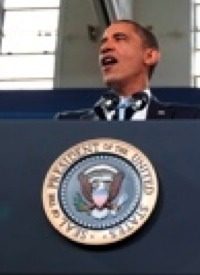
President Obama is ubiquitous in public life. Newsweek has even asked our chief executive to write an article on Haiti, in light of the recent disaster there. Michelle Obama is constantly in the news as well, first showing off her latest change in fashion, then helping some television cook show host prepare food. It is doubtful that any President or any presidential family in our national history has had more opportunities to look good in front of the nation or express the sort of broad platitudes that nearly all Americans will find nice and agreeable.
Obama, however, has also been in front of the television camera to a degree unknown to any prior president to make the case for his policies. Sometimes this involves making a presidential address or simply calling the press for an Obama speech with no questions asked afterwards. He has also appeared on innumerable Sunday talk shows, sometimes showing up on several different television networks on a single weekend. His press secretary also gives regular briefings to the White House press corps. The Obama White House has also used new media, like Facebook, to communicate with America.
There is, however, a big hole in the President’s dialogue with the nation: Obama has not held a press conference since July 22, 2009. For six months, the President has declined to face the sort of direct confrontation with the press corps that Presidents have done for the last century.
That last press conference, on July 22, was to answer questions about his reflexive criticism of the arrest of Harvard Professor Henry Louis Gates as "simply stupid," and to handle the political fallout from that statement. What makes this all the more curious is that Presidents, with only a modicum of savvy, can use any press conference to their advantage. The White House, after all, provides credentials for White House reporters to attend the press conference. The President chooses which reporters to call upon for questions. The President, in his answer, can use the common technique of pretending to answer the question but actually making a statement of his own.
The President has largely neglected any sort of public accountability for his actions or statements. Operating through surrogates, using “press conferences” that are simply joint statements in foreign nations, presenting his case through media that allow no questions, President Obama has used the “bully pulpit” often — very often, in fact — but he has also isolated himself to an enormous degree from the questions of the people.
This attitude is mirrored in the large number of Senators and Congressmen who, when the Tea Party movement began to hold town meetings around the country, simply refused to appear before the voters whom they represented to listen or to answer, directly, what their constituents were saying. This leads to politicians like Ben Nelson, widely regarded as a popular former governor and current Senator in Nebraska, being heckled in a pizza shop when he came home to Nebraska. Simply bringing home the bacon, it appears, was not enough. More than that, though, is the feeling of many Americans, which Obama’s insistence on not facing any tough or even soft questions from reporters helps solidify, that the elected officials in our nation, starting from the top, behave as if they were not our servants but our masters.
Photo: AP Images



